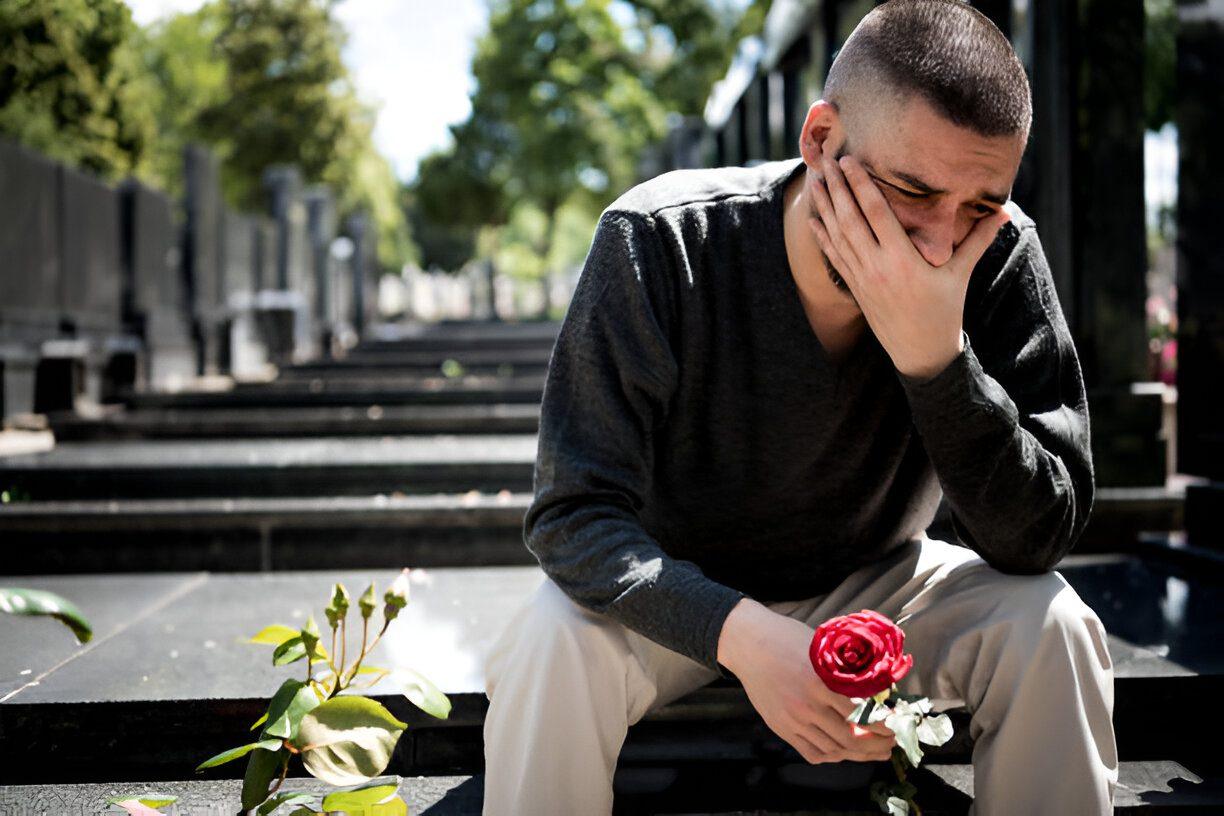A Quiet Echo of Love and Loss
In the quiet suburb of a bustling city, James woke to a silence that felt deafening, the absence of his wife’s laughter pressing against the walls like a heavy fog. His story isn’t unique—grief leaves fingerprints on every part of us, altering how we think, feel, and move through the world. More than sadness, it’s a testament to love, carried by those who remain.
“I never realized how deeply grief could affect every corner of my life—my energy, my immune system, even my sense of who I was.”
When Loss Reshapes Our Very Being

A Grief That Touches Every Part of Life
In the quiet suburb of a bustling city, James woke to a silence that felt deafening—evidence of a loss that reached beyond mere absence. Grief, as he discovered, infiltrates the mind, the body, and the spirit. It alters how we think, how we exist in the world, and how we perceive ourselves within it. More than sadness, it is a weight borne by those who remain, proof of a love deep enough to leave such a void.
The Psychological Impact of Grief
Cognitive Fog and Memory Impairment
- Grief burdens the mind with the monumental task of processing loss. Concentration, short-term memory, and decision-making can all suffer—a phenomenon sometimes referred to as “grief brain.”
Study Insight:
Research from the University of California, San Francisco, shows that grief affects the same brain regions linked to emotion regulation and memory, making even routine tasks feel exhausting.
Emotional Exhaustion and Psychological Toll
Grief often manifests as a chaotic mix of emotions—guilt, relief, anger, longing—especially in cases of prolonged grief or complicated grief disorder. Basic interactions can feel like an emotional battle, as the mind wrestles with a world that no longer feels whole.
The Physical Impact of Grief
Broken Heart Syndrome
Takotsubo cardiomyopathy, commonly known as Broken Heart Syndrome, is a stark reminder that emotional pain can have real physical consequences, mimicking heart attack symptoms under sudden stress or sorrow.
Weakened Immune System and Vulnerability
Chronic stress from grief can weaken the immune system, increasing susceptibility to infections, autoimmune disorders, and cardiovascular problems.
-
- Lifestyle Disruptions: Sleep, appetite, and energy levels often fluctuate, with some struggling to eat while others overindulge in comfort foods for solace.
Stress Hormones and the Body
-
- Cortisol: Grief triggers a spike in cortisol, the body’s primary stress hormone, which can lead to weight gain, high blood pressure, and memory issues if it remains elevated over time.
- Adrenaline: The “fight-or-flight” response can cause palpitations, anxiety, and a prolonged state of tension, especially when grief lingers.
“Grief is the echo of love resonating long after the words have ceased.” — Carolina M.
The Spiritual Impact of Grief
- The Search for Meaning
A profound loss can prompt deep questions about faith, purpose, and the universe. Some find solace in spiritual or religious practices, while others struggle with a crisis of faith, seeking understanding in the wake of loss. - Connection and Disconnection
Grief can simultaneously deepen the desire for connection with the deceased—through rituals like lighting candles or writing letters—while creating a sense of disconnection from everyday life. For some, it fosters a broader sense of empathy and unity with others who suffer.
Healing: Learning to Carry the Weight of Grief
- Finding Support
- Therapy & Support Groups: Structured spaces to process grief can be vital.
- Creative Outlets: Journaling, art, or music can channel overwhelming emotions into tangible expressions.
- Transforming Pain into Purpose
- Advocacy & Volunteering: Some turn their sorrow into action, supporting causes relevant to their loss.
- Memorializing Loved Ones: Tributes like charities, scholarships, or simply living out a loved one’s values can keep their legacy alive.
- No Linear Timeline
Grief doesn’t follow a neat progression. It ebbs and flows, and acceptance isn’t about forgetting—it’s about integrating the loss into life and finding a new normal.
Things To Try This Week!
- Body Check-In: Spend a few minutes each morning scanning your body for tension—places where grief might reside, like tight shoulders or an aching chest. Practice slow, deep breathing to release that tension.
- Memory Journal: Write one fond memory or trait of your lost loved one each day. Revisit these entries when emotions feel overwhelming, reminding you of the love that underpins your grief.
- Community Outreach: Volunteer or join a local support group dedicated to bereavement. Connecting with others who share similar experiences can provide solace and reduce feelings of isolation.
Conclusion
The Weight of Love
James, like countless others, realized that grief doesn’t vanish—it evolves. Over time, the raw ache becomes a testament to the depth of one’s capacity to love. By understanding how grief affects the mind, body, and spirit, we gain compassion for ourselves and others. Ultimately, grief is not just about mourning what was lost—it’s about honoring the love that endures, carrying it forward in every beat of our hearts.
Grief might whisper that you’re alone, but in truth, every ache echoes love.
Each step forward—whether seeking therapy, journaling, or finding a new purpose—honors that love.
For gentle reflections, creative reminders, and a supportive community, explore our cherish collections below. Together, we transform grief from a silent burden to a profound testament of devotion.
Carrying Love Beyond Loss: Embracing Healing and Connection
Grief may feel like a constant shadow, but each moment of kindness, each cherished memory, and each act of self-care brings light. Our All Things Cherish collection offers comforting insights, uplifting keepsakes, and warm communal spaces to guide you in honoring your loved one’s memory—allowing the weight of loss to become a gentle reminder of enduring love.
More Reflections, More Growth
Loss is complex, and the road to healing is different for everyone. These reflections offer insight, support, and guidance as you navigate this journey.
She Was My Whole Future—And I Lost It All in a Whisper
Celebrate the life of your loved one with the beautiful Glass Heart with Cremains. This elegant standing heart, infused with your loved one’s ashes and custom colors, creates a stunning display that glitters in the sunlight—a lasting tribute to their memory.
She Was Always Meant to Soar—And I Hope She Finally Is
Celebrate the life of your loved one with the Blue Glass Hummingbird, infused with cremation ashes. Handcrafted with vibrant blue highlights and a functional hook for display, this piece serves as a beautiful and lasting tribute to their memory.
She Fought for Every Memory—And That’s How I’ll Remember Her
Celebrate the life of your loved one with the Illuminated Memorial Glass Flame, a stunning piece infused with their cremation ashes. Handcrafted with care, this memorial flame offers a lasting tribute, beautifully illuminated by a lucite light stand to display the spiral design of their ashes.
She Found Beauty in Everything—Even in Goodbye
Celebrate the memory of your loved one with the Flower Heart Necklace, a unique cremation keepsake that combines real flowers and cremation ashes. This beautiful necklace, with its sterling silver findings, offers a heartfelt tribute to keep them close to your heart.
Everything I Know About Strength, I Learned From Her Hands
The Wire Wrapped Tree of Life with Memorial Flame combines two beautiful symbols of life and remembrance. With customizable tree and flame colors, this unique piece is a heartfelt tribute to your loved one, made with love and care to honor their legacy.
Too Beautiful for This World—Grieving a Child Who Never Got the Chance to Stay
Keep your loved one close with the stunning Spiral Helix Glass Egg, handcrafted with cremation ashes. This one-of-a-kind piece, featuring a colorful spiral set against a sleek black base, offers a unique and beautiful tribute to your loved one. Perfect for display on any mantle or sunny spot.
He Slept in the Weirdest Places—A Celebration of My Cat’s Wonderfully Chaotic Life
Celebrate the life of your cat with a beautifully crafted, hand-painted ceramic urn featuring wings and personalized engraving. This urn is designed to match your cat’s likeness, ensuring a meaningful and lasting tribute to your beloved pet. Free shipping and up to 20% off for larger family purchases.
The House is Too Quiet Without Him—A Reflection on Losing My Best Friend
Celebrate the life of your beloved dog with a handcrafted Glass Dog Bone sculpture, infused with your pet’s cremation ashes. This memorial piece is a meaningful way to keep your pet’s spirit close while honoring their memory with a beautiful, one-of-a-kind artwork.
Reaching for His Hand, Even Now—A Reflection on Love That Never Fades
Carry the memory of your loved one with the stunning Silver Oval Ring filled with cremation ashes and crushed opal. This customizable ring, available in multiple color combinations, is a beautiful way to keep your loved one close to your heart.
Explore Journeys of Healing and Solace:
Discover dedicated spaces that offer understanding, guidance, and connection through grief. From the loss of loved ones to life’s challenging transitions, each category provides a pathway to reflect, connect, and find peace in shared experiences.


























